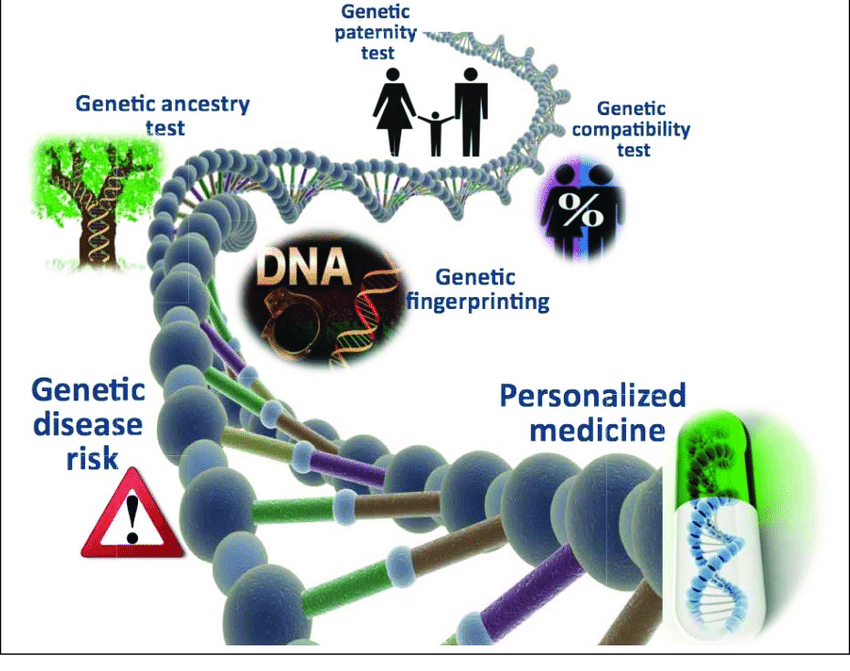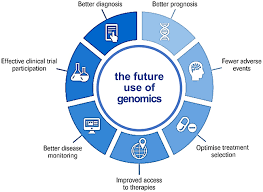Introduction:
Genomics is an exciting and rapidly evolving field that has the potential to revolutionize medicine, agriculture, and our understanding of life itself. It involves the study of genomes, the complete set of DNA within an organism, including all of its genes. By exploring the structure, function, evolution, and mapping of genomes, scientists can gain profound insights into biological processes, disease mechanisms, and the genetic basis of traits.
This blog aims to provide a comprehensive guide to genomics, covering its foundational concepts, recent advancements, applications, and future prospects.
Understanding the Basics of Genomics:
To fully grasp the significance of genomics, it’s essential to understand its foundational elements:

- DNA and Genes:
Genes are specific sequences of nucleotides that encode instructions for building proteins, which are crucial for the structure and function of cells.
- The Genome:
A genome is the complete set of DNA in an organism, encompassing all of its genes and non-coding sequences. In humans, the genome contains approximately 3 billion base pairs and about 20,000–25,000 genes. Each individual’s genome is unique, contributing to the diversity observed within species.
- Genomic Sequencing:
Genomic sequencing involves determining the precise order of nucleotides in a DNA molecule. The advent of high-throughput sequencing technologies has dramatically accelerated the ability to sequence entire genomes, making genomic data more accessible and affordable.
Key Advances in Genomics:
The field of genomics has seen remarkable advancements over the past few decades. Some key milestones include:
- The Human Genome Project:
Completed in 2003, the Human Genome Project was a landmark international effort to sequence the entire human genome. This monumental achievement provided a reference genome that has been invaluable for research and medical applications.
- Next-Generation Sequencing (NGS):
These technologies have facilitated large-scale genomic studies and personalized medicine.
- CRISPR-Cas9 and Genome Editing:
CRISPR-Cas9 is a powerful tool for precise genome editing, allowing scientists to modify specific genes within an organism’s genome. This technology has vast potential for therapeutic applications, including correcting genetic disorders and engineering disease-resistant crops.
Applications of Genomics:
Genomics, the study of an organism’s complete set of DNA, including all of its genes, is revolutionizing various fields and industries. The ability to sequence, analyze, and interpret genetic information has far-reaching implications, offering transformative potential in medicine, agriculture, environmental science, and beyond.
Medicine and Healthcare
![]()
- Personalized Medicine:
Genomics is paving the way for personalized medicine, where treatments are tailored to the genetic makeup of individual patients. By understanding genetic variations that influence disease risk and drug response, healthcare providers can develop more effective and customized treatment plans.
- Cancer Genomics: Genetic profiling of tumors helps identify specific mutations driving cancer growth. This information guides the selection of targeted therapies, improving treatment outcomes, and minimizing side effects.
- Pharmacogenomics: By studying how genetic differences affect drug metabolism and response, doctors can prescribe medications that are more effective and have fewer adverse reactions for individual patients.
Agriculture and food security
- Crop Improvement
Genomics is transforming agriculture by enhancing crop yields, nutritional quality, and resistance to diseases and environmental stresses.
- Genetically Modified Organisms (GMOs): GMOs are engineered to possess beneficial traits, such as pest resistance or enhanced nutritional content. Examples include Bt cotton, which produces its own insecticide, and golden rice, which is enriched with vitamin A.
- Marker-Assisted Selection: This technique uses genetic markers to identify desirable traits in plants, speeding
- Evolutionary Biology and Conservation:
Genomics provides insights into the evolutionary history and genetic diversity of species. This information is critical for:
- Conservation Genetics: Protecting endangered species by understanding their genetic diversity and designing effective conservation strategies.
- Phylogenomics: tracing the evolutionary relationships among species and understanding the genetic basis of adaptation.
Challenges and Ethical Considerations:
While the potential of genomics is vast, it also presents several challenges and ethical considerations.
- Data Management and Interpretation:
The sheer volume of genomic data generated by sequencing projects requires robust data storage, management, and analysis tools. Interpreting this data to derive meaningful insights is a significant challenge that necessitates advanced computational methods and bioinformatics expertise.
- Privacy and Security:
Genomic data is highly personal and sensitive. Policies and regulations must balance theneed for data sharing in research with the protection of individual privacy.
- Ethical Use and Consent:
The collection and use of genomic data must be accompanied by informed consent, ensuring that individuals understand how their data will be used. Ethical considerations also extend to the implications of genetic modifications and the potential for unintended consequences.
The Future of Genomics:
As technology advances, the field of genomics is poised to make even greater strides. Here are some future directions and potential breakthroughs:

- Integrative Omics:
The integration of genomics with other “omics” fields—such as transcriptomics, proteomics, and metabolomics—will provide a more comprehensive understanding of biological systems. This holistic approach can lead to breakthroughs in identifying disease mechanisms and discovering new therapeutic targets.
- Precision Medicine:
The future of healthcare is precision medicine, where treatments and preventive measures are tailored to the genetic profiles of individual patients. Large-scale genomic studies, combined with electronic health records and advanced analytics, will drive this personalized approach to medicine.
- Synthetic Biology:
Synthetic biology, which involves designing and constructing new biological parts and systems, will be greatly enhanced by genomic knowledge. Applications include creating synthetic organisms for industrial processes, developing new materials, and advancing bioengineering.
- Environmental Genomics:
Environmental genomics will play a crucial role in understanding and addressing global challenges such as climate change, pollution, and biodiversity loss. By studying the genomes of various organisms and their interactions with the environment, scientists can develop strategies for conservation and sustainability.
Conclusion:
Genomics is a transformative field with the potential to revolutionize many aspects of science and society. By understanding the structure and function of genomes, we can unlock new insights into biology, develop personalized medical treatments, improve agricultural practices, and address global environmental challenges. As we navigate the ethical and practical challenges of genomics, continued advancements and responsible use of this technology will be crucial to harnessing its full potential. The future of genomics promises exciting discoveries and applications that will shape our understanding of life and improve the quality of life for future generations.

